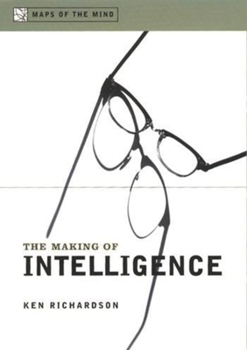The Making of Intelligence
Select Format
Select Condition 
Book Overview
What do we mean when we describe a person as intelligent? The concept of intelligence wields a powerful influence on research dealing with the brain and on how individuals progress in society. Yet, remarkably, there is no scientific consensus about the meaning of intelligence. In The Making of Intelligence Ken Richardson looks at how intelligence has been characterized and measured in the past, explores current trends in our understanding and uses of the concept, and predicts what form these trends will take in the future.
He argues that intelligence is not solely predetermined by such factors as genes and environment; it is also created by self-organizing interactions within evolved developmental systems. Considering the implications for society of this dynamic-systems approach, Richardson predicts that as our understanding of the relationship between the mind and the brain improves, the notion of intelligence as a single concept may disappear altogether. Richardson takes particularly sharp aim at IQ tests, exposing the reductionist, oversimplified, and contradictory notions of intelligence that they presuppose as well as the social repercussions of the widespread, unreflecting acceptance of the IQ model in public consciousness. From the writings of Charles Darwin and Herbert Spencer on evolution and adaptation to the reflections of Jean Piaget and Lev Vygotsky on logical reasoning; from the formulation of early IQ tests by Francis Binet and Henri Simon to their recent, provocative rebirth in the assertions of The Bell Curve by Charles Murray and Richard Herrnstein, The Making of Intelligence is a lucid, judicious, critical analysis of this controversial and important subject.Format:Paperback
Language:English
ISBN:0231120052
ISBN13:9780231120050
Release Date:June 2002
Publisher:Columbia University Press
Length:218 Pages
Weight:0.70 lbs.
Dimensions:0.5" x 6.2" x 9.1"
Grade Range:Postsecondary and higher
Related Subjects
Basic Sciences Behavioral Sciences Biological Sciences Biology Biology & Life Sciences Cognitive Psychology Developmental Psychology Experimental Psychology Health, Fitness & Dieting Health, Fitness & Dieting Internal Medicine Medical Medical Books Medicine Neuropsychology Neuroscience Psychology Psychology & Counseling Science Science & Math Science & Scientists Science & Technology TextbooksCustomer Reviews
1 rating
Questioning the obvious, and making us think twice
Published by Thriftbooks.com User , 24 years ago
A sharp and disquieting critique of IQ testing on one hand and general intelligence on the other hand. Surprisingly brief and to the point for a topic with such a long and contentious history. Even more surprisingly, and very welcome, the author presents a reasonable (though somewhat difficult to measure) alternative way of viewing intelligence, as tracing of increasingly complex covariation among relevant variables. The "points of light" experiments (recognizing biologically meaningful things from nothing but a few moving points) provides a helpful platform for discussing the strengths and weaknesses of the "module" view vs. a "construction" view based on Piaget. Along the way, the author manages to provide reasonable and well argued, if not entirely convincing, arguments against cognitive modules in general, and an interesting discussion of levels of hierarchy from genetic variation to genome regulation to epigenetic regulation to cognitive regulation, in both development and over the lifespan of individuals. I was disappointed to find that there was no solid critique of some of the proposed biological theories of general intelligence, such as the putative "string length" electroencephalogram correlate for IQ or the recent working memory theories. The critique hits those kinds of data only briefly and superficially where touched on at all, and mostly on statistical and methodological grounds rather than technical or theoretical ones. Perhaps the most effective argumentation here revolves around how IQ tests are constructed (by selecting items so that the resulting scores correlate with predefined types of success assumed to reflect intelligence); and how they have been misused historically. The main weakness from my perspective was the disappointing way the book address specific technical arguments with general methodological and statistical criticisms.Definitely worth reading, whether you agree with the author's conclusions or not, because its thought provoking insights into how we think of intelligence, and how we may be fooling ourselves through our own deep assumptions.






